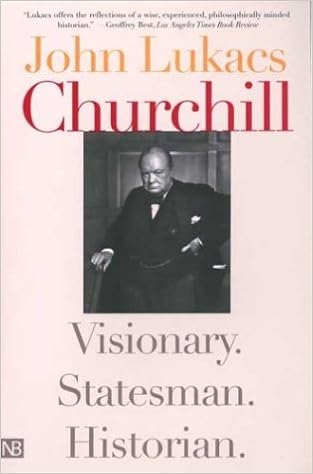'Churchill: Visionary, Statesman, Historian' - John Luckas - Review
At about two hundred pages the volume is rather brief, but it takes as broad a view of Churchill, studying of the reach and power of Churchill's mind: what he learned from reading and writing history; what he did when at the world's centre stage; what he predicted and foresaw. It is also explicitly a reply to some well-known criticisms of Churchill as thinker and actor and writer.
Lukacs raises old questions and inquiries into new trends of scholarship on Churchill with the enthusiasm of an amateur and the skills of an author of two dozen volumes. His justification for writing—and for writing another book about such a contested subject—is that ‘Historical thinking and writing and study are, by their nature, revisionist. The historian, unlike a judge, is permitted to try a case over and over again, often after finding and employing new evidence’.
Each of the nine chapters of this book concentrates on a different
aspect of Churchill's life: his relationships with other leaders, his work as a
historian, his successes, his critics, how two biographers, Jenkins and Best,
regarded him and, finally, the impression made on Lukacs himself who spent
three days in London in 1965 to attend Churchill's funeral. Lukcas disregards many of Churchill’s
controversies, such as his belief in the inherent superiority and destiny of
the Anglo-Saxon people, not by airbrushing them from the narrative as other
historians have done, but rightly seeing them as inconsequential as Churchill
did far more right than he got wrong.
Despite the abundant scholarship on the man, this volume stands
out. Lukacs has examined a few themes
which are usually glossed over in the narrative excitement of Churchill's life
convincingly to demonstrate that Churchill's instinctive understanding of his
present and view of the future - his vision - was, with the benefit of 50
years' hindsight, more perceptive than many gave him credit for.
The chapters on Churchill's relationships with Stalin, Roosevelt and Eisenhower are particularly good in this respect. Churchill was under no illusions about Stalin and the undesirability, to put it mildly, of an eastern Europe dominated by Russia. But, a whole continent dominated by the Nazis was inconceivable and thus Churchill realised he had to deal with Stalin and salvage what he could. Churchill has been criticised, especially by Poles, for Yalta but this belies the feeling Churchill had for the Poles, the appreciation of their situation and his efforts an their behalf. What ultimately did for the Poles, and the rest of eastern Europe, was the American failure to understand, as did Churchill, the subtlety of Stalin's game. At the Tehran conference Roosevelt tried to demonstrate to Stalin that he, Roosevelt, had the closer relationship to the extent of trying to sideline Churchill, a tactic which was not unnoticed by Churchill and, more importantly, by Stalin himself. Later in the war, when Churchill stressed the importance of the other allies meeting the Red Army as far east as possible and as the allies raced across Germany, Eisenhower took it upon himself (unbeknown to Churchill) in March 1945 to write to Stalin directly to say that the allies would not advance to Prague or Berlin - with fateful consequences for Europe. Again, in 1954 when Stalin died and there appeared to be a genuine opportunity for rapprochement with the new Soviet government, Eisenhower (now president) curtly rejected Churchill’s attempt to set up a summit.
Despite the American failure to support Churchill in his attempts to obtain a better deal for eastern Europe from Stalin in 1945, Churchill did win freedom for half of Europe and did, at least, ensure Greece’s freedom and Poland existed as nominally independent. And, in 1952, he predicted that within 30 years (only seven years adrift) the end of communism would be seen in eastern Europe.
There is much else of value in this book. Lukacs efficiently deals with the revisionists of the Charmley school - those who blindly criticise Churchill's amateurish historical work, as they misunderstand Churchill’s motives. It also contains some useful, even topical, thoughts on how Churchill saw Europe and the Franco- German connection.
Due to its multitude of original insights, it gets 4/5

Comments
Post a Comment